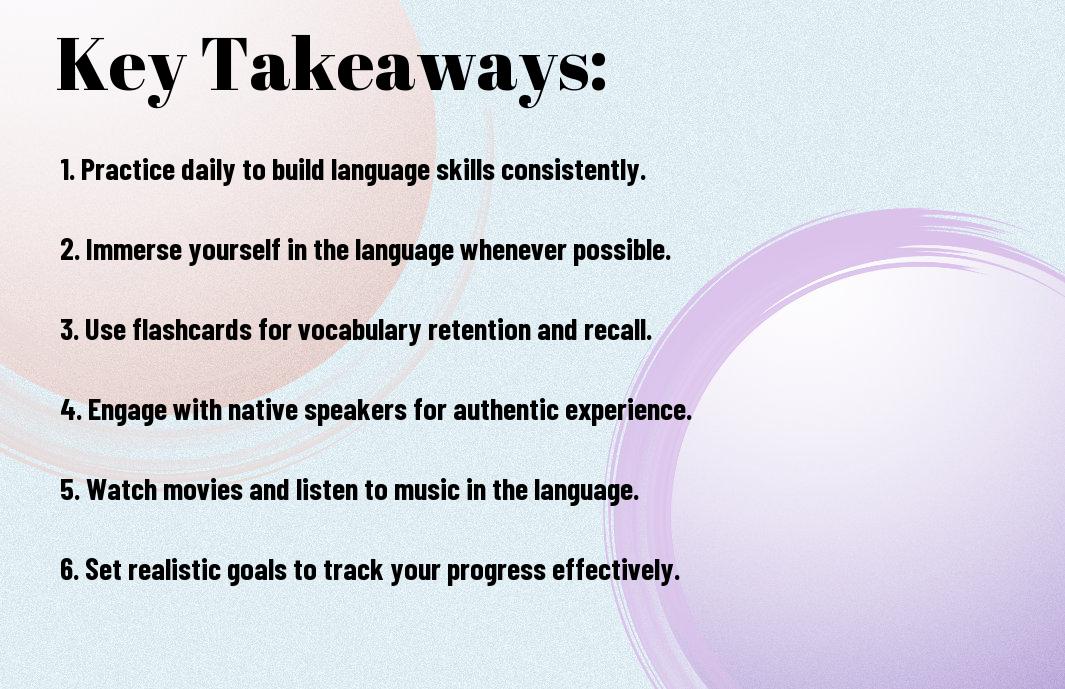As you commence on your language learning journey, you’ll discover that acquiring a new language can be a rewarding experience. You’ll be able to communicate with people from diverse cultures and broaden your perspective. Your ability to learn a new language depends on your approach, and with the right strategies, you can make significant progress. You can overcome language barriers and achieve your goals with ease, and this post will guide you through the process with simple and effective tips.————-Key Takeaways:
To improve your language learning skills, consider the following points:
- Set achievable goals and create a schedule to stay on track with your language learning journey, allowing you to monitor progress and stay motivated.
- Immerse yourself in the language by listening to music, watching TV shows or movies, and speaking with native speakers to get accustomed to its pronunciation and grammar.
- Focus on vocabulary building by learning new words and phrases daily, and practice their pronunciation to enhance your speaking skills.
- Use language learning apps and online resources to access a wide range of study materials, interactive exercises, and pronunciation guides.
- Practice consistently and be patient with yourself, as learning a new language takes time and effort, but with dedication and the right approach, you can become fluent.
Setting Goals
A clear plan is necessary when learning a new language, and it starts with setting achievable goals. You need to define what you want to accomplish and by when, helping you stay focused and motivated throughout the process.
Defining Motivation
Alongside your goals, you should consider what motivates you to learn a new language, as this will help you stay engaged and driven. You will be more likely to stick to your plan if you have a genuine interest in the language and culture.
Creating a Study Plan
Across various learning methods, having a structured study plan is vital for your success. You should allocate specific times for learning and practicing the language, ensuring consistency and progress.
Goals that are specific, measurable, and attainable are more effective, allowing you to track your progress and make adjustments as needed. You can break down your long-term goals into smaller, manageable tasks, creating a roadmap for your language learning journey, and helping you stay committed to your objectives, with your study plan serving as a guide to keep you on track.

Immersion Techniques
Even the most basic immersion techniques can significantly improve your language learning. You can start by surrounding yourself with the language you want to learn, which will help you get used to its sounds, rhythms, and grammar.
Listening to Native Speakers
Along with reading and writing, listening to native speakers is an necessary part of language learning. You can find numerous podcasts, audiobooks, and speech videos online, which will help you get familiar with the language’s pronunciation and intonation.
Watching Foreign Language Media
Behind the scenes of language learning, watching foreign language media can be a fun and engaging way to improve your skills. You can start with TV shows and movies with subtitles in your native language, which will help you understand the context and follow the story.
Due to the vast amount of foreign language media available, you can choose content that suits your interests and level of proficiency. You can watch TV shows, movies, or even YouTube videos, which will help you learn new vocabulary, phrases, and expressions in context, and improve your listening and comprehension skills.

Language Learning Strategies
Not all language learners are created equal, and your approach to learning a new language will depend on your individual needs and goals. You will need to experiment with different strategies to find what works best for you.
Focus on Grammar Rules
Alongside other skills, a nuanced understanding of grammar rules is vital for effective communication, and you can achieve this by practicing consistently and reviewing grammar rules regularly, which will help you develop a strong foundation in the language.
Building Vocabulary
Linguistically, you will need to focus on building your vocabulary, and you can do this by learning new words and phrases every day, using flashcards, and reading in the target language to get familiar with how words are used in context.
To further enhance your vocabulary, you will need to use the new words you learn in sentences, and engage in conversations with native speakers, which will help you develop a more nuanced understanding of the language and improve your ability to express yourself effectively. You can also use online resources, such as language learning apps and podcasts, to help you stay motivated and track your progress.
Practice Methods
Unlike traditional learning methods, practicing a new language requires consistent effort and dedication. You can find helpful tips on language learning by visiting 7 Tips To Learn Any Language From An Expert to improve your skills.
Speaking with Native Speakers
Among the most effective ways to practice speaking is by engaging with native speakers, which allows you to improve your pronunciation and get a feel for the language in context, helping you to become a more confident speaker.
Writing in the Target Language
For instance, writing in the target language is an excellent way to practice your grammar and vocabulary, and you can start by writing short journal entries or even social media posts to get into the habit.
A key aspect of writing in the target language is to focus on using correct grammar and vocabulary in context, allowing you to develop a more nuanced understanding of the language and improve your overall writing skills, which will also enhance your reading comprehension as you progress.
Overcoming Obstacles
Keep in mind that learning a new language can be challenging, but with the right mindset, you can overcome any obstacle and achieve your goals.
Dealing with Language Barriers
Beyond the initial difficulties, you will encounter language barriers, but you can overcome them by practicing consistently and seeking help when needed, which will help you to improve your language skills.
Staying Motivated
Linguistically, staying motivated is key to learning a new language, and you can achieve this by setting achievable goals and rewarding yourself for your progress.
This approach will help you to stay engaged and motivated throughout your language learning journey, and you will be able to track your progress and make adjustments as needed, which will ultimately help you to become proficient in the new language and achieve your goals.
Additional Resources
Now that you’ve started your language learning journey, you can supplement your efforts with additional resources, such as the article on 25 Tips to Learn a Foreign Language, which offers valuable insights to help you improve your skills.
Language Learning Apps
Learning a new language has become easier with the help of language learning apps, which provide you with interactive lessons and exercises to practice your skills on-the-go, making it easier for you to stay consistent with your learning.
Online Language Courses
Learning a language online has never been more accessible, with numerous courses available that cater to your needs and schedule, allowing you to learn at your own pace and focus on areas where you need improvement, making your learning experience more effective.
Understanding the structure and content of online language courses will help you make the most of your learning experience, as you’ll be able to identify the areas that need more attention and take advantage of the interactive features, such as quizzes, videos, and discussion forums, to practice your language skills and interact with other learners, which will help you stay motivated and achieve your goals.
Summing up
So, you now have the keys to unlock your language learning potential. You can apply these 10 easy tips to enhance your skills and make your journey enjoyable. By incorporating them into your daily routine, you will see significant improvement in your ability to learn new languages, and your confidence will grow as you achieve your goals, taking your language skills to the next level, and expanding your cultural understanding and connections.
FAQ
Q: What is the most effective way to start learning a new language?
A: To start learning a new language, it’s best to begin with the basics, such as learning the alphabet, common phrases, and basic vocabulary. Setting achievable goals and creating a study schedule can also help you stay motivated and track your progress. Additionally, immersive learning techniques, like watching TV shows or movies in the target language, can help you get accustomed to the sound and structure of the language.
Q: How can I improve my pronunciation when learning a new language?
A: Improving pronunciation in a new language can be challenging, but there are several strategies that can help. Listening to native speakers and trying to mimic their intonation and rhythm is an excellent way to start. You can also practice speaking with language exchange partners, either in person or online, to get feedback on your pronunciation. Furthermore, recording yourself speaking and comparing it to native speakers can help you identify areas that need improvement. Using online resources and language learning apps that provide pronunciation lessons and exercises can also be beneficial.
Q: What role does consistency play in learning a new language, and how can I maintain my motivation to continue learning?
A: Consistency is key when it comes to learning a new language. Setting aside a specific time each day or week to study and practice is vital for making steady progress. To maintain motivation, it’s helpful to celebrate small victories along the way, such as having a basic conversation with a native speaker or understanding a difficult text. Finding a language learning community or buddy can also provide support and encouragement. Additionally, varying your study materials and activities, such as switching between textbooks, podcasts, and language learning apps, can help keep the learning process engaging and prevent boredom.

